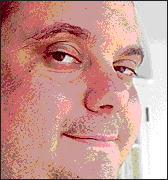

![]()
Digital Slob


![]()
Digital Slob
Live longer by
watching more
televisionOne way to recognize Digital Slobs is by how long they stare at injured people in plaster casts. Even bandaged co-workers make their heads turn like a puppy hearing an odd noise.
It's hard for them to fathom why anyone would put any undo stress on their extremities. And if it was some bizarre pursuit of happiness that caused you to go outdoors and risk life and limb, they will remind you that the safest journey begins by saying "no" to that first step.
Your typical Digital Slob will want to know exactly when you got hurt, because they want a point of reference, like, "Oh, yeah, that was when I was watching a double-take of 'Cheers' on Nick at Nite."
You see, Digital Slobs believe in a direct, positive correlation between life expectancy and amount of TV viewed.
They would point out that in 1900, life expectancy was a paltry 46 years, a bleak era when not a single person watched TV (no one knows why).
Instead, people of the Industrial Age filled their days and nights, and days again, seeing how many body parts they could donate to factory sausage grinders and still get home unassisted. Sure, it provided a little walking-around money while they could still walk around, but it was hardly a healthy hobby.
Relief came when Milton Berle's cross-dressing fetish hit the airwaves, and an entire nation was safely on its collective couch a few hours a week. Sure, we were chain-smoking next to our children within four asbestos-filled walls, but at least we were sitting down. Subsequently, life expectancy in the 1950s was up to about 69.
Now jump (carefully, not too hard) to the present day, when most watch more than four hours of TV a day. Compare that with any other fun thing. I mean, even if I focused, I couldn't eat ice cream for more than, I dunno, two hours? Two and a half?
And, as Harvard's Dr. Robert Putnam pointed out, TV viewing is the only thing that mutes our other desires. He says people who listen to classical music are more likely, not less likely, to go to a baseball game -- not so for couch potatoes. He tags TV addiction to the unraveling fabric of civic society (less voting, bake sales, book burnings, etc.).
But the same TV obsession surely reduces sudden deaths -- TV-induced heart disease takes a while to kill you, while a frayed bungee chord can take you out in a snap. Digital Slobs, in particular, might not even wait until the next commercial break to pick up a current life-expectancy chart (77 years, by the way) and say, "I told you so."
For them, it is this odd desire to go outside -- not vegetating in cozy TV chairs like veal with remote controls -- that can hasten our mortal "series finale."
Now, Respectable People, if an eruption of facts and figures hasn't caused their heads to explode already, will foolishly throw their backs out heaving forth all the research on the nation's epidemics of obesity, clogged arteries and every other malady that inactivity fosters. Advances in science and health care make for longer lives, not TV Land, they will insist, perhaps sternly shaking their fingers if they didn't break them trying to reach a higher meditative state in yoga class.
Facing such an avalanche of evidence, Digital Slobs will, without admitting defeat, retreat, because unlike too many thrill-seeking rock climbers who died never knowing the joy that is TV's "Joe Millionaire," Digital Slobs know an avalanche -- of any kind -- is best avoided.
Curt Brandao is the Star-Bulletin's
production editor. Reach him at
at: cbrandao@starbulletin.com